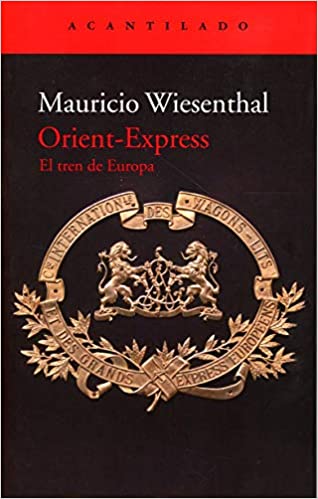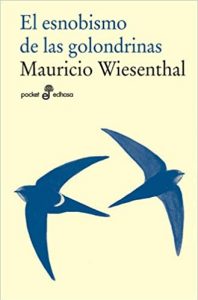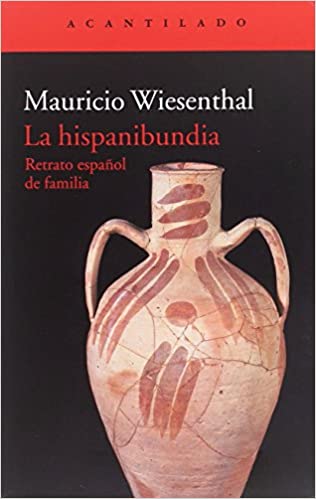The Catalan narrator Maurice Wiesenthal is paradigm of the man of letters beyond even the figure of the writer. Because literature is everything and aims at communication and even the sense of language. And Wiesenthal seeks more (and finds it) that power of the story to move between different realities with its more than ever necessary pretenses of transcendence.
Nothing is more necessary for humanity than receiving information well told from the prism of the most absolute subjectivity of everything. The truth, when it exists, is innocuous, a concept without taste or distance. Reality, on the other hand, is the final dressing watered from the subjective perspective of the traveler or of those who know the trip, if we are talking about travel books, for example, as occurs with works of art. Javier Reverte or Paul Theroux.
Hence, types like Wiesenthal transmit life as literature, composing the story of what has been lived from a historical, anthropological or even oenological aspect (given the author's particular taste for the latter world). And so his books take on that added value to finally be highly recommended reading one of his books.
Top 3 recommended books by Mauricio Wiesenthal
Orient express
The man laid out the most beautiful metal artery to unite all of Europe in a longitudinal axis. With the nineteenth-century evocation of it, life moved forward on the rails of the Orient-Express in a rattling of longings, passions, hopes, endless nights and dreams of modernity. No one better than Don Mauricio to bring us the aroma of those wagons with a visa to the most splendid past.
The Orient-Express was for decades the symbol of a diverse Europe, full of varied characters, smells, colors and flavors, united by this train that, more than a means of transportation, was an extraordinary form of civilization and understanding between people. towns.
Mauricio Wiesenthal, with his enveloping and fragrant prose, transports us to countries and stations, tells their stories and legends, and creates a vivid and evocative story, halfway between memories and essays. «The literature of the train has to be, necessarily, impressionistic and confusing. The train gives us a destination, a distance, an afterlife without significance or final judgment. And that makes stories more beautiful and voluptuous that, like train nights or love adventures, have no beginning or end.
The snobbery of swallows
With the necessary and undoubted part of subjective impression that every travel book has, this work leads us through those underworlds that still coexist with tourism in any city in the world.
As spaces also in danger of extinction, Wiesenthal's literature serves the cause of some last snapshots of the urban appearance of large cities that distinguish them from the rest, far beyond the uniformity of the commercial and the recognizable for second-rate travelers. they get nervous if they can't find a Zara in Johannesburg.
The center of the narrative revolves around numerous cities in which the author has resided and tells about them both transcendental anecdotes and all kinds of surprising details and curious stories, always related to the world of culture. Thus we will travel hand in hand with the author through Vienna, Seville, Topkapi, Rome, Florence, Paris, Dublin, Versailles, Barcelona, etc. Discovering unexpected things and corners.
Hispanibundia
It is curious that, when a narrator of castizo surnames sets out to tell something about the Spain that was or the essences of what it is today, every son of a neighbor prepares himself with his turn labels to elevate the aforementioned to the altars of the fascism or communism. It says a lot about the polarized not only socially but also mentally.
So, being equally Spanish, but entering his surname in a different way for illiterates on either side of the trench, the vote of confidence gives to attend a more relaxed reading and enjoy a story with shared traces in this Iberia separated from the rest of Europe by the Pyrenees and with its perimeter moat full of seas and oceans ...
«It is possible that hispanibundia is nothing more than the vehementia cordis (vehemence of the heart) that, according to Plinio, distinguished Hispanics. With hispanibundia the theologians of the Counter-Reformation reacted to Luther's theses. Moved by the Spanish fever, the conquerors ventured into the deserts, the holy mountain ranges, and the jungles of the New World.
Hispanibundia threw our Invincible army against the coasts of Great Britain and Ireland. And with Spanish pain, the best pages of our literature were written. Hispanibundia is the vibrant energy that Spaniards produce when they live, whether they think they are Spanish or not, accept it or not, find themselves in forced exile or pretend to be a foreigner in their homeland and a stranger to their loved ones.
Convinced that peoples can only change when they make an honest effort to know their history, Mauricio Wiesenthal tries to contribute his grain of sand to understand that complex reality that has been shaped over centuries and of which, for better or better. for the worse, we are part of it and we are heirs.



